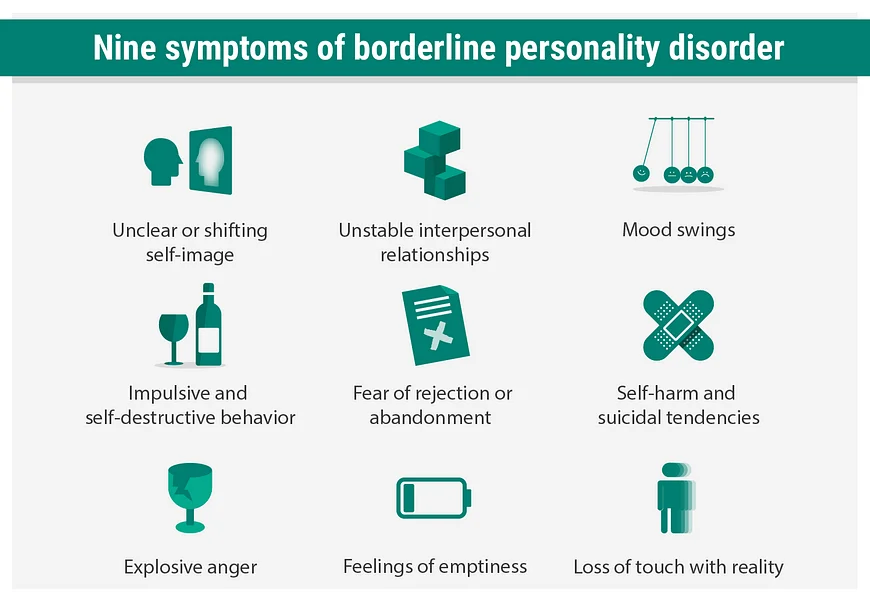Supporting someone with Borderline Personality Disorder
About Borderline Personality Disorder (BPD)
Borderline Personality Disorder (BPD) is a term used to describe a pattern of problems that usually start in adolescence or early adulthood and affect most areas of life, causing the person (and often those close to them) significant distress over a number of years. With early diagnosis, appropriate treatment and support, the likelihood of symptom remission and/or recovery is good.
Studies now show that a combination of factors may lead to a person developing BPD, and this can vary from person to person. These factors include our genetic makeup, which we are born with, early life experiences (which may or may not include experiences of neglect, abuse, loss or trauma), and various social factors. There are nine symptoms that are associated with BPD and a diagnosis requires the presence of at least five of these symptoms:
Supporting friends and family with Borderline Personality Disorder
If your loved one has borderline personality disorder, it’s important to recognize that he or she is suffering and their expressions can be a reaction to the emotional pain they are experiencing.
It is important to know and accept that people with BPD often have a heightened sensitivity to what is said, to body language, facial expressions and to situations. This may result in their reactions appearing impulsive or volatile. Keep in mind this is a part of the illness and it is important for carers to remain calm and try to understand why the person with BPD is reacting the way they are. Just as it is important for those with BPD to keep in mind that BPD is an illness. Responding with anger or perceived rejection can escalate the situation.
Although it can be difficult, it is necessary to remember that their hurtful behaviours are not about you. It is motivated by the desire to stop the pain they are experiencing. It is rarely deliberate.
Strategies for Families and Carers relating to a Person with BPD
- When a person with BPD is in a crisis - remain CALM.
- Communication - Keep an open line of communication.
- Acceptance - of the person’s distress and they are trying to manage their emotions to the best of their ability at that moment.
- Listening- to what the person is really saying to you.
- Mindful - the person may be feeling more vulnerable and distressed than you would in a similar situation.
- Separate the person’s thoughts and feelings from their behaviours. This makes it easier to really hear the emotional distress and to not respond to just their actions.
- Maintaining a respectful attitude towards the person with BPD and let them know that you genuinely value and care about them.
- Learn to identify your own triggers and how you can manage them when a situation is becoming difficult. If you can keep your own cool, it can help prevent a situation from worsening
- Encourage the person with BPD to develop an action plan between themselves and a mental health professional (and yourself – if appropriate) that includes what to do in a crisis situation. A written action plan helps to ensure that risks are minimised and safety networks and responses are in place.
- Strategies can be developed when everyone is calm and communication between you and the person is open and clear.
- If it’s not an appropriate time, reassure the person that you want to have a conversation and suggest an alternative time and place to do so. It is very important to keep to your agreement.
- When the person is calm, discuss what they perceive to be their emotional triggers and how these triggers may be understood or recognised in future.
- Be clear about your own limits of acceptable behaviour. Avoid the blame and shame game. No one likes to be put down.
- When you make a mistake, acknowledge it and use this as a learning tool to explore other alternatives for your own behaviour.
- Practice self-care tips by taking time out from your caring role perhaps meeting up with a friend for coffee and allowing yourself some leisure time.
- Learn about BPD to help you understand and accept what is happening. Education also improves communication with the person, the family and others outside the family, especially mental health professionals. Speaking to other carers, reading, workshops and BPD carer support groups may be useful.
- Seek professional assistance to support you in your carer role.
Information obtained from the Australian BPD Foundation Limited - https://www.bpdfoundation.org.au/
Explore other ways we can support you and your loved ones Personal Wellbeing.
More related articles available here.

